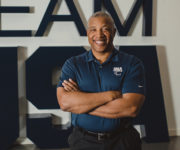Meet the Match
An Executive Striving for Kazakhstan's Disabled Athletes
Yerlan Suleimenov was born to a close-knit family in Astana, Kazakhstan’s capital city. With his older brother, he practiced sports, especially martial arts. The two were so close that they even launched a small business together as teenagers, which Yerlan says quickly helped them realize “we were not businesspeople at all.”
With one career choice out of the way, Yerlan decided to become a lawyer so he could defend and uphold human rights in Kazakhstan and abroad. At the age of 19, however, he became unexpectedly ill with bone cancer and was forced to have one of his legs amputated.
“My world ended when I became ill and lost my leg,” Yerlan says. “But, then my mother, brother and all of the people close to me came and showed me I could live even without a leg. That opened up my eyes and I knew that I wanted to help people with disabilities become champions.”
In 2003, Yerlan completed a Master of Laws degree at Kazakhstan’s largest university, L.N. Gumilyov Eurasian National University. After four years as a senior lecturer, he transitioned into working with SOS Children’s Villages Kazakhstan, an international NGO that focuses on children’s rights. In seven years he rose to become deputy national director and organized a number of projects in collaboration with international organizations such as UNICEF, UNESCO, and the UN Refugee Agency (UNCHR).
Last year, the opportunity came for Yerlan to become executive director of the National Paralympic Committee of Kazakhstan.
“Because of my professional experience, I knew how you must speak to people from the different government ministries, businesses, and sponsors to show them that it is not easy for a person in a wheelchair to become a champion,” Yerlan says. “And I can also speak the language to a person with a disability. I know their problems. I understand their pain, what they need, and what kind of support I can give them.”
Unlike in many other countries, Kazakhstan’s NPC is neither government-financed, nor the top disability organization in the country. Officially, it is an NGO that works in collaboration with other Parasport federations and does not have its own athletes and coaches. As a result, it is very important for Yerlan to secure financial and structural support from the Ministry of Sport, as well as sponsorships and donations from private businesses.
“The Paralympic movement is not only about rehabilitation of disabled people, it is about the image of Kazakhstan,” Yerlan says. “If we do not receive more support, the NPC will have to close its doors and we will not be able to represent our country in international competition.”
Like in Kazakhstan, the U.S. Olympic Committee is a non-profit, of which U.S. Paralympics is a division. Throughout its history, the USOC has been very successful in fundraising and securing corporate sponsorships for its many programs. John Register, a two-time Paralympian and noted motivational speaker, oversees community and veterans programs for U.S. Paralympics and has a long resume of experience in program development, networking, and communications. John, who also served as a Sports Envoy for track and field in Uzbekistan in March 2016, connected Yerlan with key influencers inside the USOC, as well as guided him through developing relationships with media, community partners, and potential donors. Together, the two men came up with a plan that allowed Yerlan to return to Kazakhstan and work on creating a sustainable platform that will guarantee athletes with disabilities can achieve success for the country at elite international competitions like the Paralympics.
Read the Blog Article
